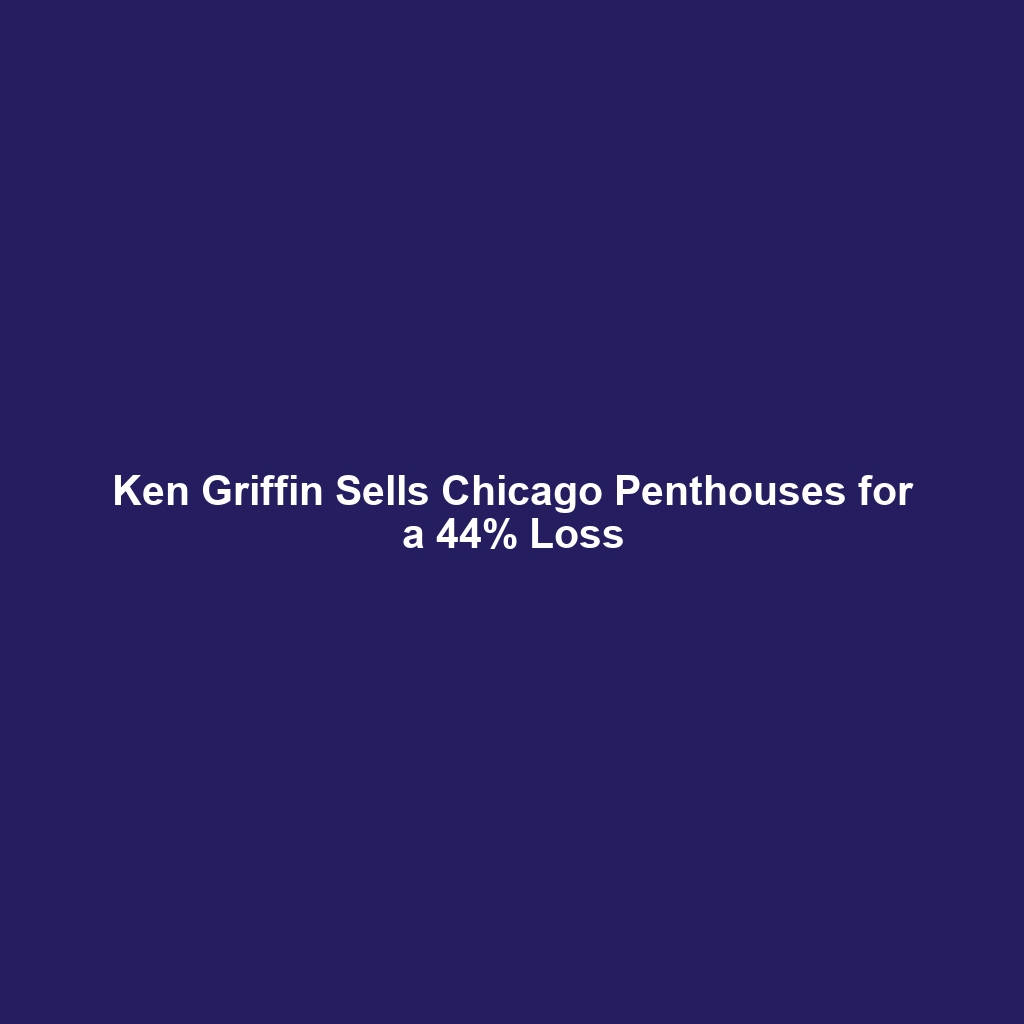Your cart is currently empty!
Tag: Chicago Real Estate

Ken Griffin Sells Chicago Penthouses at a Loss
Ken Griffin Sells Chicago Penthouses at a Loss
Ken Griffin Sells Chicago Penthouses at a Loss
Ken Griffin, the billionaire founder of hedge fund Citadel, has sold his prominent Chicago penthouses at a staggering loss, amounting to over $19 million. This significant divestment marks Griffin’s latest move as he shifts his focus toward the rapidly expanding luxury real estate market in Florida.
Details of the Sale
The sale of Griffin’s Chicago condos, located in the upscale buildings known as 1000 Lake Shore Drive and the Waldorf Astoria, generated considerable headlines. According to publicly available records and sources close to the transaction, Griffin initially bought the properties for approximately $58 million but sold them for around $39 million.
The affected properties, notable for their luxurious amenities and stunning views of Lake Michigan, had been key fixtures in Griffin’s Chicago real estate portfolio. The condos boasted features including extensive outdoor spaces and state-of-the-art design, appealing to high-end buyers in the Chicago market.
Implications of the Move
This decision to sell at a loss has raised eyebrows among real estate analysts, especially given Griffin’s significant investments in the Chicago area historically. Experts suggest the move reflects a broader trend within the luxury real estate market, characterized by a migration of affluent individuals and families from urban centers like Chicago to more suburban or warmer climates, particularly Florida.
“High-net-worth individuals are increasingly drawn to markets that offer not only luxury but also favorable tax conditions,” said John Burns, a real estate consultant. “Florida, with no state income tax, is particularly attractive to wealthy buyers who are looking to preserve their wealth.”
Griffin’s Florida Investments
In light of this estate maneuvering, Griffin’s investments in Florida are increasingly noteworthy. He has made headlines for acquiring a $200 million mansion in Palm Beach, a symbol of his shift in focus towards the Sunshine State’s lavish real estate market. This property, once owned by the late owner of the Miami Dolphins, is one of the highest-priced private sales in the state’s history.
The decision to tighten his ties to Florida may also align with business goals, seeking to create a more robust local presence amid a competitive landscape. Griffin has long been an advocate for philanthropic initiatives in Florida, further solidifying his commitment to the state.
Market Trends and Analysis
Griffin’s exit from the Chicago property market highlights a significant shift influenced by changing economic conditions and personal priorities among the ultra-wealthy. Chicago real estate has experienced various fluctuations in property values, particularly during the pandemic, which prompted many to reassess their living situations.
While Chicago remains a central hub for businesses and culture, higher taxes and climate factors have contributed to a growing number of individuals considering relocation. A recent study from Realtor.com indicated that cities like Miami and Palm Beach have seen an influx of residents escaping urban centers, reflecting broader lifestyle changes.
Reactions from Real Estate Experts
Reactions from real estate experts have been mixed. Some view Griffin’s sale as a potential bellwether for other high-end property owners contemplating similar moves. “When such a recognizable figure like Griffin exits the market, it prompts questions about the broader implications for affluent buyers in Chicago,” noted Emily Smith, a Chicago-based real estate analyst.
Conversely, others maintain that these decisions are personal and not necessarily reflective of the market at large. “High-net-worth individuals operate differently than everyday buyers. Their choices are often driven by lifestyle preferences rather than market trends,” said David Hall, a luxury real estate agent.
Conclusion
Ken Griffin’s recent sale of his Chicago penthouses at a significant loss underscores a transformative period in high-end real estate. While the decision represents personal financial loss for Griffin, it aligns with a larger movement of affluent individuals seeking opportunities that better match their evolving lifestyle choices. As luxury markets continue to shift, the outlook for Chicago’s high-end real estate will depend on multiple factors, including the allure of competing regions like Florida.
As the dynamics of urban living evolve in favor of suburban and warmer climates, it remains to be seen how this trend will reshape property values and investment opportunities moving forward. Real estate analysts will undoubtedly continue to monitor highlights such as Griffin’s exit as important indicators of the changing landscape of luxury real estate.

Ken Griffin Sells Chicago Penthouses for a 44% Loss
Ken Griffin Sells Chicago Penthouses for a 44% Loss
Billionaire Ken Griffin, the founder and CEO of hedge fund Citadel, has made headlines this week after selling two unused penthouses in Chicago at a staggering loss of 44%. This move marks a significant shift for Griffin, who has been a prominent figure in the Chicago real estate market. With these sales, Griffin officially exits the Windy City, signaling a new chapter in his business and personal life as he relocates to Florida.
Details of the Sale
Griffin sold the combined properties for approximately $19 million, a drastic reduction from the $34 million he reportedly paid for them. The two penthouses, located within the 1000M building in the South Loop neighborhood, had remained largely unused, further compounding the decision to unload them.
Both units offered sweeping views and luxury finishes, including top-of-the-line appliances and expansive outdoor spaces. However, the substantial loss incurred highlights the challenges faced by high-end real estate in urban centers, especially amid fluctuating market conditions.
Market Context
The transaction occurs against a backdrop of declining property values in Chicago’s luxury market, which has experienced difficulty following the COVID-19 pandemic. The trend of businesses and wealthy individuals moving out of major metropolitan areas to more suburban or different locales has only accelerated in recent years. In particular, Miami has emerged as a popular choice for affluent individuals seeking favorable tax conditions and warmer climates.
According to data from Real Capital Analytics, high-end residential property sales in Chicago declined by approximately 10% year-over-year as of Q3 2023. This shift raises questions about the future of luxury real estate in the city, particularly as more individuals prioritize different lifestyle choices enhanced by remote work capabilities.
Griffin’s Business Landscape
Ken Griffin is not just a real estate mogul; his hedge fund Citadel is one of the leading financial firms globally. With a net worth estimated at over $29 billion, Griffin’s financial successes have allowed him to invest heavily in real estate. However, these fluctuations in the market illustrate the inherent risks associated with such investments.
Seth A. Pinsky, a real estate expert and former president of the New York City Economic Development Corporation, stated, “When you’re in the luxury market, you’re not just selling a property; you’re selling a lifestyle. Economic shifts can shift consumer preferences rapidly, particularly in high-value sectors.”
The Impact on Chicago
Griffin’s departure from Chicago will mark the end of an era for the billionaire, who has been synonymous with the city’s financial resurgence. His philanthropy and investment in local education initiatives have made a lasting impact on the community.
City officials and local business leaders have expressed concern that such high-profile exits could deter other potential investors. “While one individual’s exit may not represent a trend, it does highlight some underlying challenges our market must address,” noted local economic analyst Brian O’Leary.
Looking Ahead
As Griffin turns to Florida, where he has purchased a $200 million penthouse, the broader implications of his Chicago exit remain to be seen. Investors and analysts alike will be monitoring how other affluent individuals react in this shifting landscape. The transition may signify a wider trend of increased investments in states with appealing tax structures and climates.
Furthermore, the Chicago real estate market faces pivotal changes ahead. As residents and businesses continue to adapt to a post-pandemic world, local leaders must devise strategies to attract and retain investors like Griffin, who have the potential to shape the economic landscape.
Conclusion
Ken Griffin’s sale of his Chicago penthouses at a considerable loss underscores the volatility of the high-end real estate market, compounded by broader economic dynamics. As he embarks on his new journey in Florida, his exit leaves a significant void in Chicago’s luxury market that will require careful navigation by local stakeholders. For now, the future of Chicago’s affluent community remains uncertain, but the outcomes of such high-profile moves will undoubtedly shape its trajectory.